Would lavce pelagonski care to share his opinion here after I did him the favor and shared mine in the thread he requested? I see you are a scientist as well, this ought to make for a great insight. :-)
Perceptions of God, Creationism and Evolution
Collapse
This topic is closed.
X
X
-
The problems with the Bible that New Testament scholar Bart Ehrman discussed in his bestseller Misquoting Jesus—and on The Daily Show with John Stewart, NPR, and Dateline NBC, among others—are expanded upon exponentially in his latest book: Jesus, Interrupted. This New York Times bestseller reveals how books in the Bible were actually forged by later authors, and that the New Testament itself is riddled with contradictory claims about Jesus—information that scholars know… but the general public does not. If you enjoy the work of Elaine Pagels, Marcus Borg, John Dominic Crossan, and John Shelby Spong, you’ll find much to ponder in Jesus, Interrupted.
I read this book and found it to be not only shocking but absolutely indefinite as to the realities of the bible and how christianity was formed. I recommend anyone interested in the subject to pick this book up by Bart Ehrman.Slayer Of The Modern "greek" Myth!!!
Comment
-
-
TM, you used this guy previously and I'll provide the same comments as I did then. He's a hack. He either has not researched the topic (sticking to some superficial atheist websites for this "scholarly" sources and his own imagination) or he's deliberately making up lies. The amount of factual errors he's made in his work is beyond comprehension.Originally posted by TrueMacedonian View Posthttp://books.google.com/books?id=QDi...page&q&f=false
I read this book and found it to be not only shocking but absolutely indefinite as to the realities of the bible and how christianity was formed. I recommend anyone interested in the subject to pick this book up by Bart Ehrman.If my people who are called by my name will humble themselves and pray and seek my face and turn from their wicked ways, I will hear from heaven and will forgive their sins and restore their land. 2 Chronicles 7:14
The Revolution was in the minds and hearts of the people; a change in their religious sentiments, of their duties and obligations...This radical change in the principles, opinions, sentiments, and affections of the people was the real American Revolution. John Adams
Comment
-
-
Vangelovski have you have actually read the text, the book you mentioned seems to have had no critical reviews in the manner you described and has been well received
I suggest you take part in open discussion elsewhere because you seem very stubborn on this topic and have wasted allot of energy on it here as a admin you must be able to aknowledge that at least
Comment
-
-
Zarni, I have read it and the book has recieved lots of critical reveiws, some of which even made it to wikipedia. Its considered a joke not worthy of opinion in academic circles.Originally posted by Zarni View PostVangelovski have you have actually read the text, the book you mentioned seems to have had no critical reviews in the manner you described and has been well received
I suggest you take part in open discussion elsewhere because you seem very stubborn on this topic and have wasted allot of energy on it here as a admin you must be able to aknowledge that at least
Do you just post for the sake of posting? All you've done on this thread and every other is make some sweeping statements that have no basis in reality.If my people who are called by my name will humble themselves and pray and seek my face and turn from their wicked ways, I will hear from heaven and will forgive their sins and restore their land. 2 Chronicles 7:14
The Revolution was in the minds and hearts of the people; a change in their religious sentiments, of their duties and obligations...This radical change in the principles, opinions, sentiments, and affections of the people was the real American Revolution. John Adams
Comment
-
-
Tom, Bart Ehrman brings up many factual points about the bible itself and how comparing relative gospels to each other reveals many discrepencies about how human the scriptures are. When I have some more available time I'll scan some pages relevant to this topic.Originally posted by Vangelovski View PostTM, you used this guy previously and I'll provide the same comments as I did then. He's a hack. He either has not researched the topic (sticking to some superficial atheist websites for this "scholarly" sources and his own imagination) or he's deliberately making up lies. The amount of factual errors he's made in his work is beyond comprehension.Slayer Of The Modern "greek" Myth!!!
Comment
-
-
Bart provides a superficial reading of the gospels, taking verses out of their cultural, textual and historical context. Further, he makes some blatantly false statements about the gospels (which are either outright lies or due to ignorance). Either way, his works are pathetic.Originally posted by TrueMacedonian View PostTom, Bart Ehrman brings up many factual points about the bible itself and how comparing relative gospels to each other reveals many discrepencies about how human the scriptures are. When I have some more available time I'll scan some pages relevant to this topic.
TM, you're picking up the worst of the worst atheists.If my people who are called by my name will humble themselves and pray and seek my face and turn from their wicked ways, I will hear from heaven and will forgive their sins and restore their land. 2 Chronicles 7:14
The Revolution was in the minds and hearts of the people; a change in their religious sentiments, of their duties and obligations...This radical change in the principles, opinions, sentiments, and affections of the people was the real American Revolution. John Adams
Comment
-
-
Sir George so I dont repeat myself I have collected some Early quotes of mine
cloning has negative effects, and I never said anything about medicine Im studying about haw drugs and viruses interact with the human body - being a scientist doesnt mean you have to be an atheist or agree with all fields of science.
Its when God said dont eat the apple and Adam and Eve did and they had the knowledge of good and evil. People have a choice between right and wrong and scientists have a choice between what is ethically and socially right as it has good and bad side-effects on people lives.it is not a matter of having an open mind it is about making the right decisions and not trying to clone or resurrect dead animals.
Are you a scientist? If not then you cant really fully comprehend what a scientist with a clear mind can do...we are not God and thus must not meddle in his work. ie. designer babies (people must be mental)dont believe everything a scientist says, the fist thing I was told starting my science degree was "do not think that everything you read in scientific journals is fact they are theories that are put out there to be disproved and if they can not at that particular time we have to begrudgingly accept them until someone can disprove them"
Im a scientist and I believe in God (people please use capital letter) I think that there is no big bang (unless God clapped his hands)....evolution is out of the question we did not come from apes that is stupid and many other "theories".The Doctrine of the Orthodox Church: The Basic Doctrines
COUNCILS AND CONFESSIONS
All Orthodox credal formulas, liturgical texts, and doctrinal statements affirm the claim that the Orthodox Church has preserved the original apostolic faith, which was also expressed in the common Christian tradition of the first centuries. The Orthodox Church recognizes as ecumenical the seven councils of Nicaea I (325), Constantinople I (381), Ephesus (431), Chalcedon (451), Constantinople II (553), Constantinople III (681), and Nicaea II (787) but considers that the decrees of several other later councils also reflect the same original faith (e.g., the councils of Constantinople that endorsed the theology of St. Gregory Palamas in the 14th century). Finally, it recognizes itself as the bearer of an uninterrupted living tradition of true Christianity that is expressed in its worship, in the lives of the saints, and in the faith of the whole people of God.
In the 17th century, as a counterpart to the various “confessions” of the Reformation, there appeared several “Orthodox confessions,” endorsed by local councils but, in fact, associated with individual authors (e.g., Metrophanes Critopoulos, 1625; Peter Mogila, 1638; Dostheos of Jerusalem, 1672). None of these confessions would be recognized today as having anything but historical importance. When expressing the beliefs of his church, the Orthodox theologian, rather than seeking literal conformity with any of these particular confessions, will rather look for consistency with Scripture and tradition, as it has been expressed in the ancient councils, the early Fathers, and the uninterrupted life of the liturgy. He will not shy away from new formulations if consistency and continuity of tradition are preserved.
What is particularly characteristic of this attitude toward the faith is the absence of any great concern for establishing external criteria of truth—a concern that has dominated Western Christian thought since the Middle Ages. Truth appears as a living experience accessible in the communion of the church and of which the Scriptures, the councils, and theology are the normal expressions. Even ecumenical councils, in the Orthodox perspective, need subsequent “reception” by the body of the church in order to be recognized as truly ecumenical. Ultimately, therefore, truth is viewed as its own criterion: there are signs that point to it, but none of these signs is a substitute for a free and personal experience of truth, which is made accessible in the sacramental fellowship of the church.
Because of this view of truth, the Orthodox have traditionally been reluctant to involve church authority in defining matters of faith with too much precision and detail. This reluctance is not due to relativism or indifference but rather to the belief that truth needs no definition to be the object of experience and that legitimate definition, when it occurs, should aim mainly at excluding error and not at pretending to reveal the truth itself that is believed to be ever present in the church.
GOD AND MAN
The development of the doctrines concerning the Trinity and the incarnation, as it took place during the first eight centuries of Christian history, was related to the concept of man’s participation in divine life.
The Greek Fathers of the church always implied that the phrase found in the biblical story of the creation of man (Gen. 1:26), according to “the image and likeness of God,” meant that man is not an autonomous being and that his ultimate nature is defined by his relation to God, his “prototype.” In paradise Adam and Eve were called to participate in God’s life and to find in him the natural growth of their humanity “from glory to glory.” To be “in God” is, therefore, the natural state of man. This doctrine is particularly important in connection with the Fathers’ view of human freedom. For theologians such as Gregory of Nyssa (4th century) and Maximus the Confessor (7th century) man is truly free only when he is in communion with God; otherwise he is only a slave to his body or to “the world,” over which, originally and by God’s command, he was destined to rule.
Thus, the concept of sin implies separation from God and the reduction of man to a separate and autonomous existence, in which he is deprived of both his natural glory and his freedom. He becomes an element subject to cosmic determinism, and the image of God is thus blurred within him.
Freedom in God, as enjoyed by Adam, implied the possibility of falling away from God. This is the unfortunate choice made by man, which led Adam to a subhuman and unnatural existence. The most unnatural aspect of his new state was death. In this perspective, “original sin” is understood not so much as a state of guilt inherited from Adam but as an unnatural condition of human life that ends in death. Mortality is what each man now inherits at his birth and this is what leads him to struggle for existence, to self-affirmation at the expense of others, and ultimately to subjection to the laws of animal life. The “prince of this world” (i.e., Satan), who is also the “murderer from the beginning,” has dominion over man. From this vicious circle of death and sin, man is understood to be liberated by the death and Resurrection of Christ, which is actualized in Baptism and the sacramental life in the church.
The general framework of this understanding of the God-man relationship is clearly different from the view that became dominant in the Christian West—i.e., the view that conceived of “nature” as distinct from “grace” and that understood original sin as an inherited guilt rather than as a deprivation of freedom. In the East, man is regarded as fully man when he participates in God; in the West, man’s nature is believed to be autonomous, sin is viewed as a punishable crime, and grace is understood to grant forgiveness. Hence, in the West, the aim of the Christian is justification, but in the East, it is rather communion with God and deification. In the West, the church is viewed in terms of mediation (for the bestowing of grace) and authority (for guaranteeing security in doctrine); in the East, the church is regarded as a communion in which God and man meet once again and a personal experience of divine life becomes possible.
CHRIST
The Orthodox Church is formally committed to the Christology (doctrine of Christ) that was defined by the councils of the first eight centuries. Together with the Latin Church of the West, it has rejected Arianism (a belief in the subordination of the Son to the Father) at Nicaea (325), Nestorianism (a belief that stresses the independence of the divine and human natures of Christ) at Ephesus (431), and Monophysitism (a belief that Christ had only one divine nature) at Chalcedon (451). The Eastern and Western churches still formally share the tradition of subsequent Christological developments, even though the famous formula of Chalcedon, “one person in two natures,” is given different emphases in the East and West. The stress on Christ’s identity with the preexistent Son of God, the Logos (Word) of the Gospel According to John, characterizes Orthodox Christology. On Byzantine icons, around the face of Jesus, the Greek letters ” —the equivalent of the Jewish Tetragrammaton YHWH, the name of God in the Old Testament—are often depicted. Jesus is thus always seen in his divine identity. Similarly, the liturgy consistently addresses the Virgin Mary as Theotokos (the “one who gave birth to God”), and this term, formally admitted as a criterion of orthodoxy at Ephesus, is actually the only “Mariological” (doctrine of Mary) dogma accepted in the Orthodox Church. It reflects the doctrine of Christ’s unique divine Person, and Mary is thus venerated only because she is his mother “according to the flesh.”
This emphasis on the personal divine identity of Christ, based on the doctrine of St. Cyril of Alexandria (5th century), does not imply the denial of his humanity. The anthropology (doctrine of man) of the Eastern Fathers does not view man as an autonomous being but rather implies that communion with God makes man fully human. Thus the human nature of Jesus Christ, fully assumed by the divine Word, is indeed the “new Adam” in whom the whole of humanity receives again its original glory. Christ’s humanity is fully “ours”; it possessed all the characteristics of the human being—”each nature (of Christ) acts according to its properties,” Chalcedon proclaimed, following Pope Leo—without separating itself from the divine Word. Thus, in death itself—for Jesus’ death was indeed a fully human death—the Son of God was the “subject” of the Passion. The theopaschite formula (“God suffered in the flesh”) became, together with the Theotokos formula, a standard of orthodoxy in the Eastern Church, especially after the second Council of Constantinople (553). It implied that Christ’s humanity was indeed real not only in itself but also for God, since it brought him to death on the cross, and that the salvation and redemption of humanity can be accomplished by God alone—hence the necessity for him to condescend to death, which held humanity captive.
This theology of redemption and salvation is best expressed in the Byzantine liturgical hymns of Holy Week and Easter: Christ is the one who “tramples down death by death,” and, on the evening of Good Friday, the hymns already exalt his victory. Salvation is conceived not in terms of satisfaction of divine justice, through paying the debt for the sin of Adam—as the medieval West understood it—but in terms of uniting the human and the divine with the divine overcoming human mortality and weakness and, finally, exalting man to divine life.
What Christ accomplished once and for all must be appropriated freely by those who are “in Christ”; their goal is “deification,” which does not mean dehumanization but the exaltation of man to the dignity prepared for him at creation. Such feasts as the Transfiguration or the Ascension are extremely popular in the East precisely because they celebrate humanity glorified in Christ—a glorification that anticipates the coming of the Kingdom of God, when God will be “all in all.”
Participation in the already deified humanity of Christ is the true goal of Christian life, and it is accomplished through the Holy Spirit.
THE HOLY SPIRIT
The gift of the Holy Spirit at Pentecost “called all men into unity,” according to the Byzantine liturgical hymn of the day; into this new unity, which St. Paul called the “body of Christ,” each individual Christian enters through Baptism and “chrismation” (the Eastern form of the Western “confirmation”) when the priest anoints him saying “the seal of the gift of the Holy Spirit.”
This gift, however, requires man’s free response. Orthodox saints such as Seraphim of Sarov (died 1833) described the entire content of Christian life as a “collection of the Holy Spirit.” The Holy Spirit is thus conceived as the main agent of man’s restoration to his original natural state through Communion in Christ’s body. This role of the Spirit is reflected, very richly, in a variety of liturgical and sacramental acts. Every act of worship usually starts with a prayer addressed to the Spirit, and all major sacraments begin with an invocation to the Spirit. The eucharistic liturgies of the East attribute the ultimate mystery of Christ’s Presence to a descent of the Spirit upon the worshipping congregation and upon the eucharistic bread and wine. The significance of this invocation (in Greek epiklesis) was violently debated between Greek and Latin Christians in the Middle Ages because the Roman canon of the mass lacked any reference to the Spirit and was thus considered as deficient by the Orthodox Greeks.
Since the Council of Constantinople (381), which condemned the Pneumatomachians (“fighters against the Spirit”), no one in the Orthodox East has ever denied that the Spirit is not only a “gift” but also the giver—i.e., that he is the third Person of the holy Trinity. The Greek Fathers saw in Gen. 1:2 a reference to the Spirit’s cooperation in the divine act of creation; the Spirit was also viewed as active in the “new creation” that occurred in the womb of the Virgin Mary when she became the mother of Christ (Luke 1:35); and finally, Pentecost was understood to be an anticipation of the “last days” (Acts 2:17) when, at the end of history, a universal communion with God will be achieved. Thus, all the decisive acts of God are accomplished “by the Father in the Son, through the Holy Spirit.”
THE HOLY TRINITY
By the 4th century a polarity developed between the Eastern and Western Christians in their respective understandings of the Trinity. In the West God was understood primarily in terms of one essence (the Trinity of Persons being conceived as an irrational truth found in revelation); in the East the tri-personality of God was understood as the primary fact of Christian experience. For most of the Greek Fathers, it was not the Trinity that needed theological proof but rather God’s essential unity. The Cappadocian Fathers (Gregory of Nyssa, Gregory of Nazianzus, and Basil of Caesarea) were even accused of being tri-theists because of the personalistic emphasis of their conception of God as one essence in three hypostases (the Greek term hypostasis was the equivalent of the Latin substantia and designated a concrete reality). For Greek theologians, this terminology was intended to designate the concrete New Testamental revelation of the Son and the Spirit, as distinct from the Father.
Modern Orthodox theologians tend to emphasize this personalistic approach to God; they claim that they discover in it the original biblical personalism, unadulterated in its content by later philosophical speculation.
Polarization of the Eastern and the Western concepts of the Trinity is at the root of the Filioque dispute. The Latin word Filioque (“and from the Son”) was added to the Nicene Creed in Spain in the 6th century. By affirming that the Holy Spirit proceeds not only “from the Father” (as the original creed proclaimed) but also “from the Son,” the Spanish councils intended to condemn Arianism by reaffirming the Son’s divinity. Later, however, the addition became an anti-Greek battle cry, especially after Charlemagne (9th century) made his claim to rule the revived Roman Empire. The addition was finally accepted in Rome under German pressure. It found justification in the framework of Western conceptions of the Trinity; the Father and the Son were viewed as one God in the act of “spiration” of the Spirit.
The Byzantine theologians opposed the addition, first on the ground that the Western Church had no right to change the text of an ecumenical creed unilaterally and, second, because the Filioque clause implied the reduction of the divine persons to mere relations (“the Father and the Son are two in relation to each other, but one in relation to the Spirit”). For the Greeks the Father alone is the origin of both the Son and the Spirit. Patriarch Photius (9th century) was the first Orthodox theologian to explicitly spell out the Greek opposition to the Filioque concept, but the debate continued throughout the Middle Ages.
THE TRANSCENDENCE OF GOD
An important element in the Eastern Christian understanding of God is the notion that God, in his essence, is totally transcendent and unknowable and that, strictly speaking, God can only be designated by negative attributes: it is possible to say what God is not, but it is impossible to say what he is.
A purely negative, or “apophatic” theology—the only one applicable to the essence of God in the Orthodox view—does not lead to agnosticism, however, because God reveals himself personally—as Father, Son, and Holy Spirit—and also in his acts, or “energies.” Thus, true knowledge of God always includes three elements: religious awe; personal encounter; and participation in the acts, or energies, which God freely bestows on creation.
This conception of God is connected with the personalistic understanding of the Trinity. It also led to the official confirmation by the Orthodox Church of the theology of St. Gregory Palamas, the leader of Byzantine hesychasts (monks devoted to divine quietness through prayer), at the councils of 1341 and 1351 in Constantinople. The councils confirmed a real distinction in God, between the unknowable essence and the acts, or “energies,” which make possible a real communion with God. The deification of man, realized in Christ once and for all, is thus accomplished by a communion of divine energy with humanity in Christ’s glorified manhood.
http://www.stprohor.org.au/the-doctr...sic-doctrines/“This kind of demon, cannot be driven out but by prayer and fasting.”
In this Gospel, God clearly shows us the reason for our infirmities and sufferings, which is our non-belief or weak faith. When God told the boy’s father: “If you can believe? Everything is possible for him who believes! “ He shouted with tears and said:” I believe Lord, Help my non-belief!” He humbled, accepted his weakness and weak faith and in repentance he confessed, that is why God gave him the strength to believe and healed his son.
If we pay a little more attention to Jesus’ answer, we will notice that the cure and therapy prescribed by our Lord, is spiritual: the faith in God, the prayer and the fasting. This is because the core and essence of our life is spiritual. The man is a psychophysical being, created from the dust of the ground (substance) in the image and likeness of God, to be in eternal union with his God and Creator. But after the transgression, the sin entered the world and disease, suffering, sorrow, misfortune followed … Yet, the merciful God has not given up completely of His creation and gave us a way of repentance and salvation, so now the man is always in a position between the two poles, life and death, good and evil, God and mammon (the devil). When man will forget God, (non belief) then the sin and disease will enter into him. When man will get closer to God, then he heals and thrives. If our spirit is healthy than our body will be healthy.
According to God Jesus Christ, the remedy and therapy for each weakness and disease is the prayer and fasting which, unfortunately, we all have forgotten. We have forgotten these two main things in the spiritual life, therefore the devil has very easy access to us.
From today’s Gospel, we can understand how our mutual relationships are, how they go from one extreme to another extreme and yet we are powerless to control them.
Why?
St. April Paul calls: Brothers … Put on the full armor of God so that you can take your stand against the devil’s schemes for our struggle is not against flesh and blood, but against the rulers, against the authorities, against the powers of this dark world and against the spiritual forces of evil in the heavenly realms. (Eph. 6.12 to 13). This means our battle is spiritual.
The devil is clever and a spirit in nature and acts through our ideas and thoughts. If we do not have the prayer, then he can easily come into us and manipulate with our thoughts. If we believe him, we have already created a problem. The devil is the father of lies and a man murderer and he wants us to argue, to separate, execute, destroy and push us into hell. If we are foolish and stupid and begin to accept his thoughts and start open dialogue with them, instead of praying to God to enlighten our minds and dismiss them, then we can easily believe in his thoughts and identify them as true, which in turn darken our minds and create the sin as God forbids. If we don’t wake up on time, then we will end up with unwanted things and big consequences.
The prayer is a conversation and a communion with the living God. Practicing the prayer we have our mind and heart to God and our concentration to God, through love. The communion with Him gives us His grace, which is a fire for demons, so they do not have access to us, which then they twitch, paralyze and run away from us. God reveals “This kind of demon, cannot be driven out but by a prayer and fasting.”
Prayer should always be supported by fasting. Fasting does not only mean avoiding a certain kind of food, but also abstinence from everything that is superfluous and unnecessary. By suppressing our thoughts, our desires and passions, we have control over ourselves and we tie devil’s feet and hands, not allowing him to have influence on us. The Holy Fathers say fasting and prayer are the two wings of our soul to the heavenly kingdom. Therefore, let us love fasting and prayer with the whole soul and strength, and put them into practice and accept with our life, so to call victory over sin and worship the Holy Resurrection. Amen.Стравот на Атина од овој Македонец одел до таму што го нарекле Страшниот Чакаларов гркоубиец и крвожеден комитаџија.
Ако знам дека тука тече една капка грчка крв, јас сега би ја отсекол целата рака и би ја фрлил в море. Васил Чакаларов
Comment
-
-
Sir George I hope that helps for know. Being a scientist doesnt mean you can not believe in God, in most cases it brings you closer when you discover how complex everything around us it.Last edited by lavce pelagonski; 06-25-2011, 10:10 PM.Стравот на Атина од овој Македонец одел до таму што го нарекле Страшниот Чакаларов гркоубиец и крвожеден комитаџија.
Ако знам дека тука тече една капка грчка крв, јас сега би ја отсекол целата рака и би ја фрлил в море. Васил Чакаларов
Comment
-
-
Yes, I can agree with that sentiment. Would you happen to be more a pantheist I'm guessing? Sorry if that's a personal question.Originally posted by lavce pelagonski View PostSir George I hope that helps for know. Being a scientist doesnt mean you can not believe in God, in most cases it brings you closer when you discover how complex everything around us it.
Comment
-
-
Vangelovski again you have for the second time referred to my contributions as not worthy and implied I am stupid
an apology would be nice by you but I doubt I would get it
I ran up a few reviews of the book 5 for good measure they all seemed positive, maybe there are just as many I didnt spot to the opposite frankly I don’t care just making a point most who contribute to Forums really if ever read posted sources or even click on URLS links it is easily noticed
Here I am telling you as a admin what you are not doing right by the Forum and again you resort to emotional retorts honestly dude how do you function in life.
Comment
-
-
Sir George I do not consider myself a pantheist I am Orthodox, God created the Heaven and the Earth.Стравот на Атина од овој Македонец одел до таму што го нарекле Страшниот Чакаларов гркоубиец и крвожеден комитаџија.
Ако знам дека тука тече една капка грчка крв, јас сега би ја отсекол целата рака и би ја фрлил в море. Васил Чакаларов
Comment
-
-
Emotional retorts? I'm one of the very few people who even bothered to provide evidence on this thread to demonstrate why they believe what they do. As usual, you seem to jump on a particular bandwagon and then make sweeping statements about issues you obviously don't understand.Originally posted by Zarni View PostVangelovski again you have for the second time referred to my contributions as not worthy and implied I am stupid
an apology would be nice by you but I doubt I would get it
I ran up a few reviews of the book 5 for good measure they all seemed positive, maybe there are just as many I didnt spot to the opposite frankly I dont care just making a point most who contribute to Forums really if ever read posted sources or even click on URLS links it is easily noticed
Here I am telling you as a admin what you are not doing right by the Forum and again you resort to emotional retorts honestly dude how do you function in life.If my people who are called by my name will humble themselves and pray and seek my face and turn from their wicked ways, I will hear from heaven and will forgive their sins and restore their land. 2 Chronicles 7:14
The Revolution was in the minds and hearts of the people; a change in their religious sentiments, of their duties and obligations...This radical change in the principles, opinions, sentiments, and affections of the people was the real American Revolution. John Adams
Comment
-
-
Tom, Ehrman is an Agnostic not an Atheist. Here are some pages from his book Jesus, Interrupted;Originally posted by Vangelovski View PostBart provides a superficial reading of the gospels, taking verses out of their cultural, textual and historical context. Further, he makes some blatantly false statements about the gospels (which are either outright lies or due to ignorance). Either way, his works are pathetic.
TM, you're picking up the worst of the worst atheists.
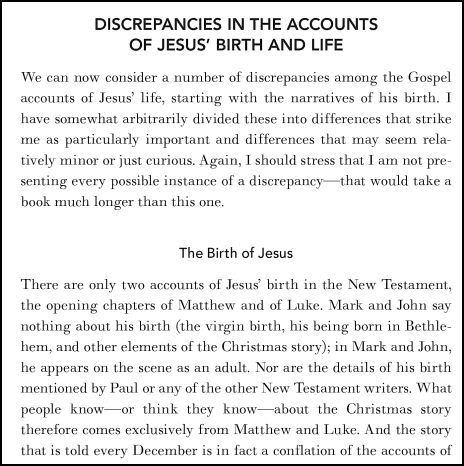
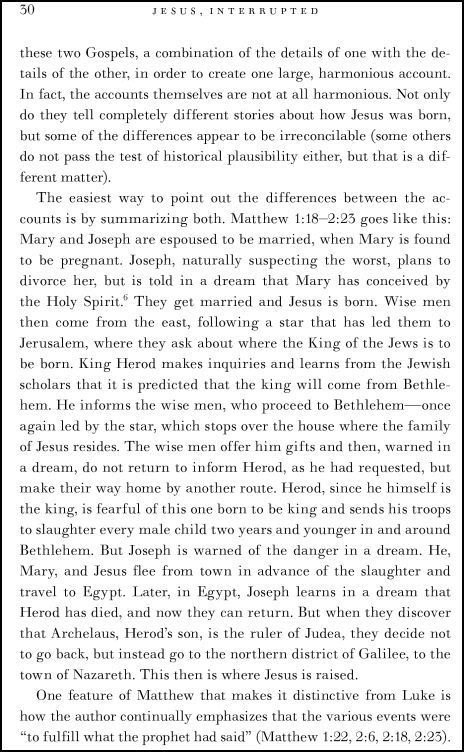
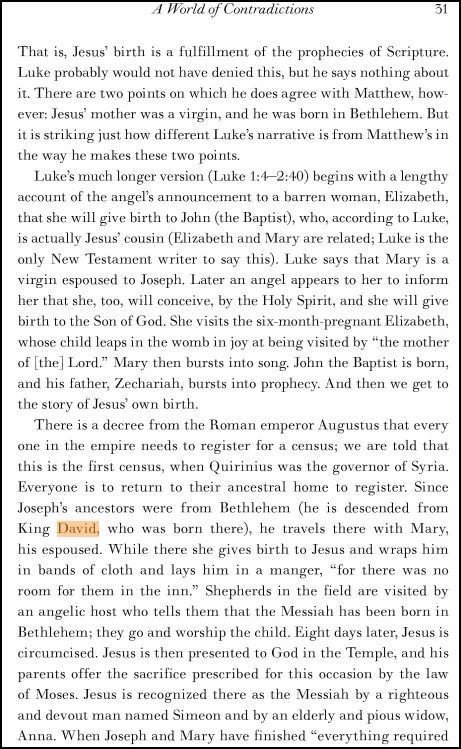
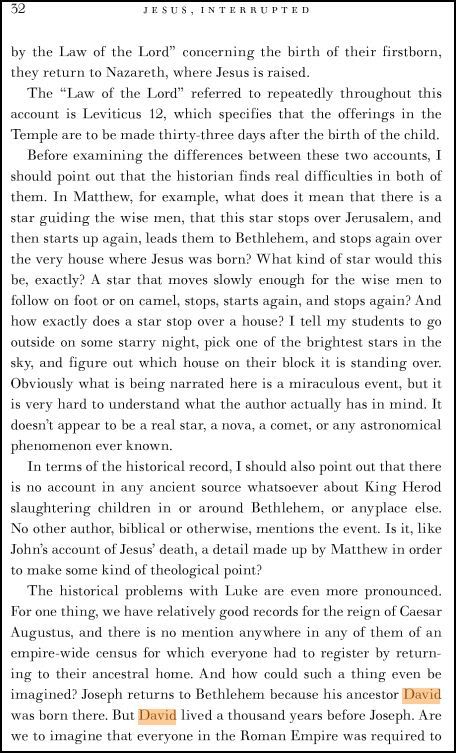
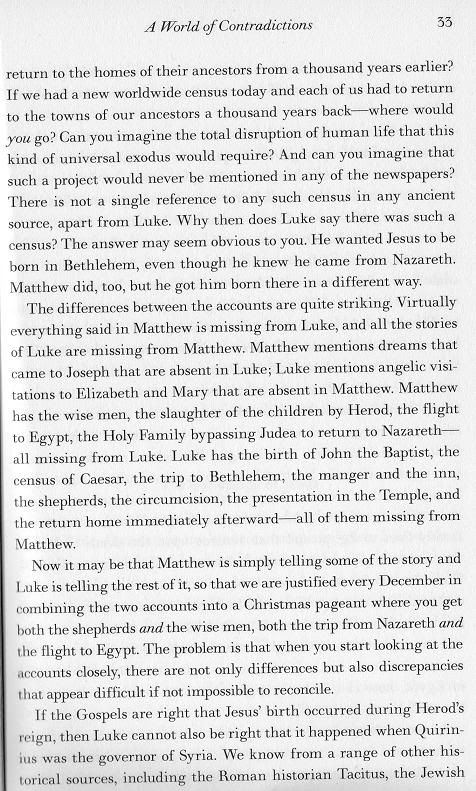
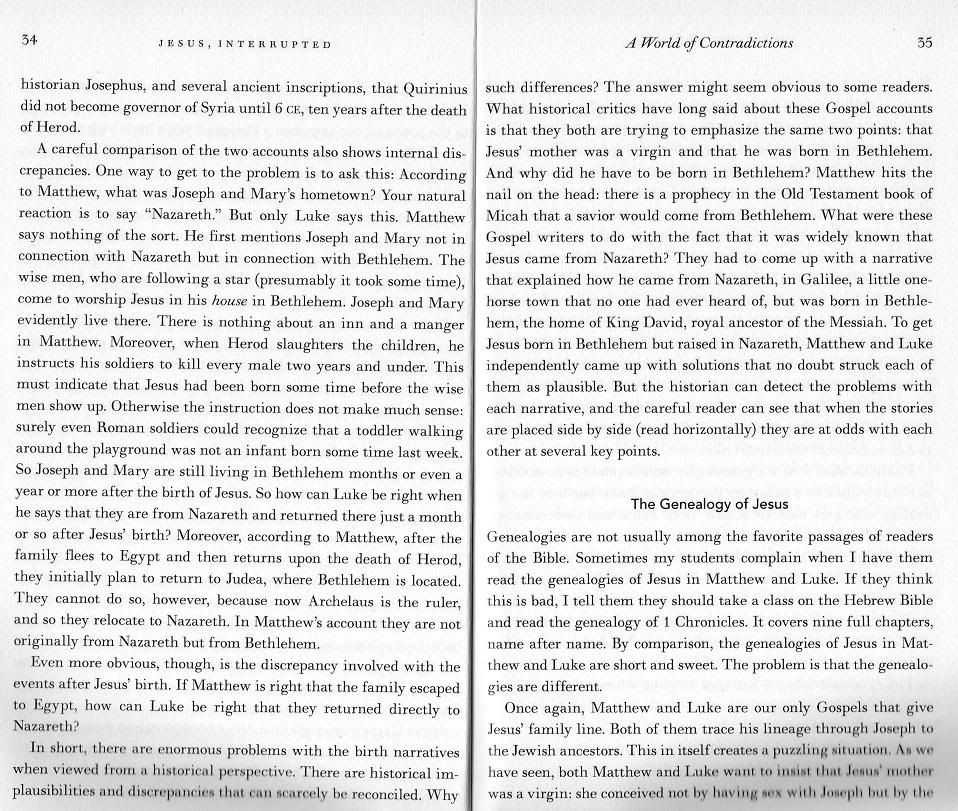
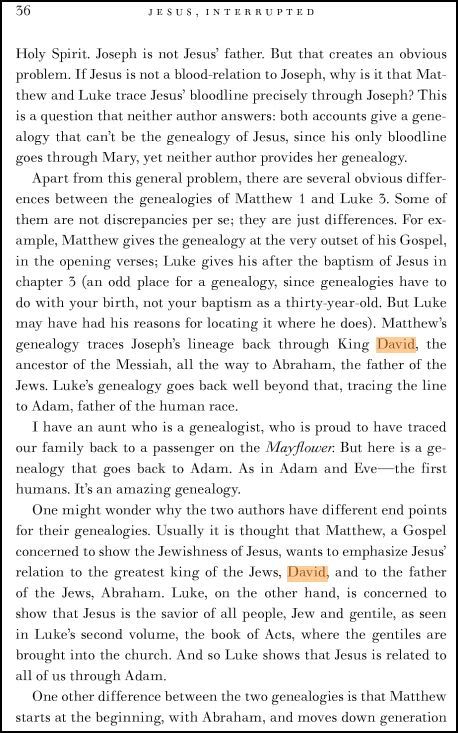
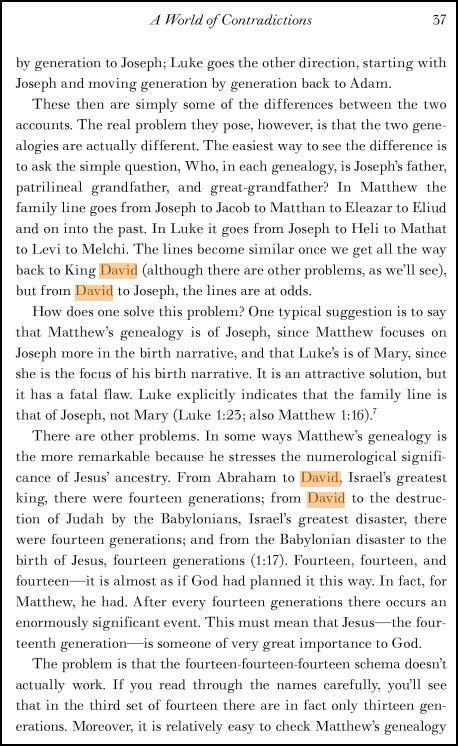
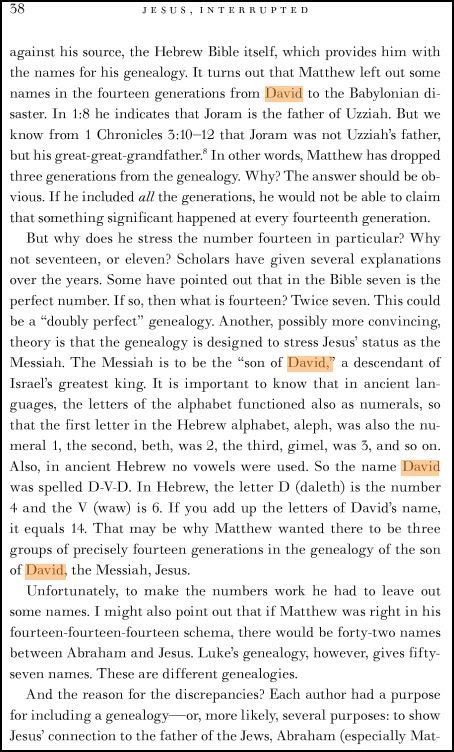
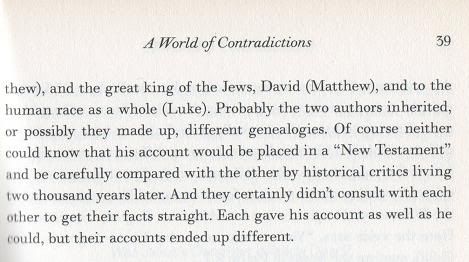 Slayer Of The Modern "greek" Myth!!!
Slayer Of The Modern "greek" Myth!!!
Comment
-
Comment